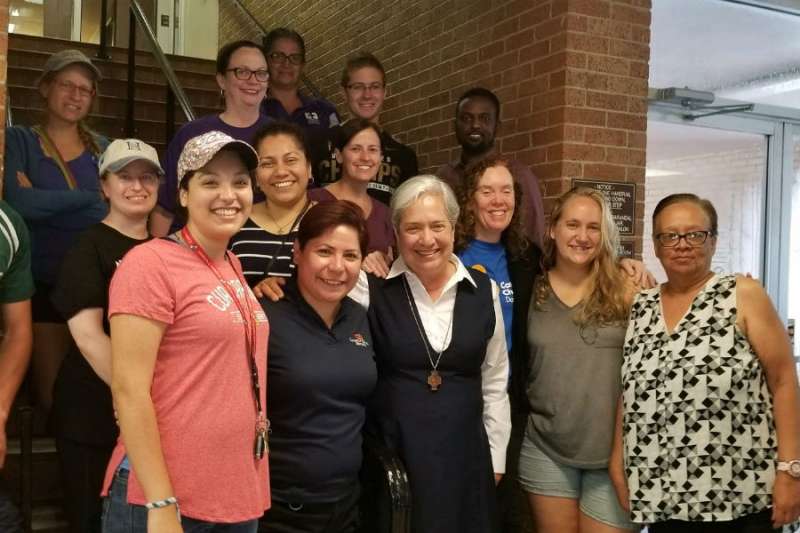Every single mother or father arriving at Catholic Charities Humanitarian Respite Center in McAllen, Texas was able to tell Pio del Castillo exactly how long they had been separated from their child at the U.S.-Mexico border.
“One month and 13 days.”
“One month and 27 days.”
“Two months and 3 days.”
“They were counting the days and hours,” Castillo told CNA, “For me, to be able to cry with them was the most satisfying job that I have ever done.”
Castillo, from Dallas, Texas, is one of many volunteers from Catholic Charities who traveled from all over the country to the U.S.-Mexico border to aid with the surge of families released from detention centers and in need of assistance.
As the U.S. government worked to a tight-deadline in July to reunite the more than 2,000 separated families, Catholic Charities USA put out a call for more staff and volunteers.
Castillo was between jobs in Dallas when he heard his pastor talking about going to the border to help.
“I was like, ‘Wait a minute. I’m bilingual, trilingual actually, and I am able to help,” Castillo told CNA. He immediately emailed the person in charge of volunteer opportunities at his church, and they put him in touch with Catholic Charities of Dallas.
Not long after, Castillo was working 12-15 hour days at the humanitarian respite center. He conducted intake interviews with the newly released and reunited families as they arrived at the center, where Sister Norma Pimentel and her staff served hot meals and helped connect the migrants with their relatives.
To begin his intake interview, Castillo would say in Spanish, "We are here to help,” but he quickly realized that his small word of kindness would lead many of the migrants to break down crying.
“You don't know what we have been through. It was horrible not knowing where my kid was,” one parent told Castillo.
Another mother asked him, “Does your organization offer psychological help? My daughter has this separation anxiety and I don't know how to deal with this.”
“A lot of the kids had this psychological trauma of being separated from their parents,” explained Castillo, who saw the results at firsthand with the newly reunited families who arrived at the center.
Castillo was accompanying a mother and daughter when they passed two immigration officers wearing green uniforms. “As soon as she saw these men dressed in green, she [the daughter] started shaking and hiding behind her mom … the kid was so nervous that she dropped her coloring book and all of her crayons on the floor.”
“Then something beautiful happened,” said Castillo, “One of the officers helped her so delicately to pick up every single crayon and put it in the box and you could see the kid relaxing a little bit. That was a beautiful moment that I will never forget.”
“I feel that our duty was to help alleviate a little bit of the trauma of these families being separated,” said Castillo.
"Our entire goal at Catholic Charities, throughout this entire border crisis issue, has been families first,” said Carla Goss of Catholic Charities of Dallas, “We need to remember that everyone involved is a human first and foremost.”
Catholic Social Services in Columbus, Ohio, also answered Sister Norma’s call for assistance at the border, sending professional staff members to help coordinate volunteers and the other logistics involved in serving 1,800 families at the respite center.
"We had an opportunity to see in a different way what for most people was just a news story that was far away and on the border,” Catholic Social Services President and CEO Rachel Lustig told CNA.
Lustig had the opportunity to meet with one woman from Honduras who had been recently reunited with her daughter. Most of the migrants her Ohio team served in Texas came from El Salvador, Honduras, and Guatemala. Speaking to CNA, she recalled one such encounter.
“One woman had left Honduras because of domestic violence in her home and because she couldn't find a way to get recourse and safety with the local government. She was afraid for her life and the life of her daughter, who is only five years old.”
Over the course of four weeks in a detention center, the mother only had two phone calls with her daughter, who wouldn't talk to her on the other end of the line. “All she would do was cry. It was heartbreaking for her,” Lustig explained.
Lustig said that the their experiences at the border has inspired her team to put more time and energy into their local Our Lady of Guadalupe Center, which serves the new immigrant population of Columbus.
“We have a very deep sense of connection and solidarity to what was going on at the border,” said Lustig.
Although the majority of separated families were reunited by the July 26 deadline, some 463 families remain apart because the accompanying parent was deported from the U.S.

